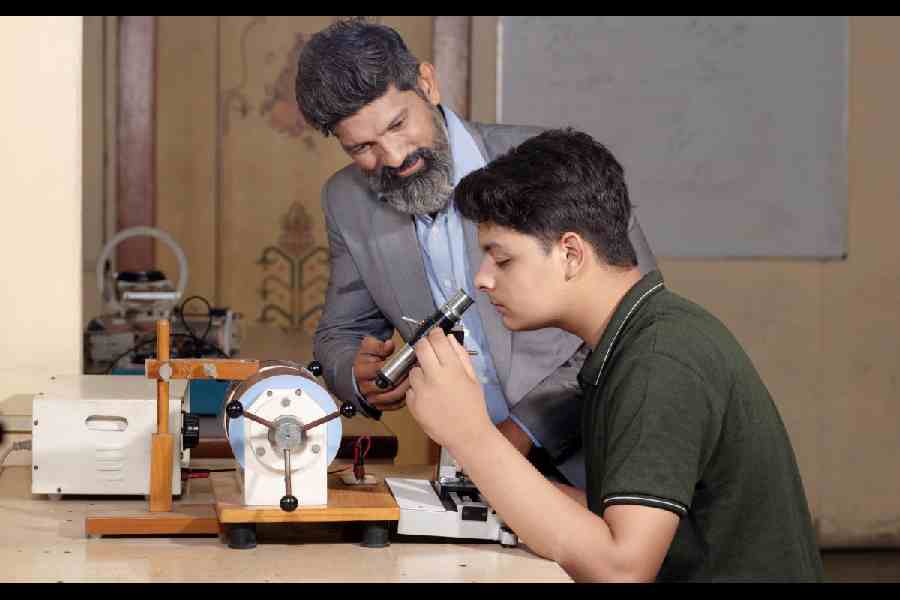Ready. Steady. Go: Time for high school students to get set with lab researches


Holding politicians accountable, choosing the right friends and doing advanced maths, all require a common skill — the ability to think critically. One of the fundamental ways to develop critical thinking is to engage in research. In recent years, high school students have begun undertaking research projects across various domains. Engaging in research stirs curiosity and takes learning beyond the classroom. Creating an environment that encourages young people, the next generation of thinkers and problem-solvers, to participate in research is crucial.
Some may believe high school students are too young to do research but that is not the case. Several teenagers have gained recognition for creating innovative solutions to global issues. Take Gitanjali Rao who invented Tethys, an early lead contamination detection tool. Jack Andraka developed a groundbreaking method to detect certain cancers in the early stage while Elif Bilgin is known for her innovative work in environmental sustainability. These teenagers conducted significant research and provided real-world solutions to problems facing our planet.
Among the different school boards in India, the International Baccalaureate (IB) programme engages students in research work. Students must complete an independent research project resulting in a 4,000-word paper. “For most students in India, apart from those in the IB curriculum, conducting research is a completely new way of learning. Research involves discovering new knowledge by building exploration skills rather than being instructed on what to memorise or recall. Through this process, students learn to discover ‘truth’ as scientists do,” says Stephen Turban, co-founder of Lumiere Education, which offers students research programmes and links to mentors.
There has been a notable shift towards encouraging research in non-scientific domains. “Significant research is done in social sciences, behavioural patterns, demographic consumption, economic inequalities, political shifts and so on. Students across disciplines can get into research,” says Rajiv Khosla, who is vice-president, external engagement, Plaksha University, Mohali.
Engaging in research projects equips students with a spectrum of invaluable skills. First, research fosters critical thinking by encouraging students to analyse information, question assumptions and draw evidence-based conclusions. This skill is foundational, influencing decision-making and problem-solving across academic and real-world contexts. Second, research nurtures effective communication skills. Students learn to articulate complex ideas coherently through presenting their findings, whether in written reports or oral presentations. “For our high school students, we add another component to their research process — we ask them to engage with a social problem through the design for change process. This adds the element of social purpose,” says Anju Soni, principal of Shiv Nadar School, Noida.
A well-executed research project stands out on a college application, showcasing initiative, passion and a commitment to intellectual exploration. In a study on the rising role of research in college admissions, dean of admissions at the University of Pennsylvania, E. Whitney Soule, reported that nearly one-third of the admitted students engaged in academic research during high school.
Krishang Todi, a second-year student at Carnegie Mellon University in the US, says that the exposure to research in high school ignited a passion that continued into college. As a student of Class XI at Don Bosco, Calcutta, he had done a research project on fossil fuels. “I was curious to know what it would be like, thought it would enhance my academic performance and bring excitement to routine subjects. My experience not only transformed my approach to learning economics, connecting theories to current world events, but also positively impacted my college applications,” says Todi.
There are many ways to embark on a research journey. Some educational programmes, such as AP (offered by College Board, US) Cambridge and IB, provide structured opportunities for projects. Alternatively, students can approach a research mentor, such as a professor or teacher, for guidance. Some established programmes offer a structured environment and mentorship. Self-directed research is also possible for those who are self-motivated.
Engaging in research is an exciting journey of exploration, discovery and intellectual curiosity for students. It’s not just about finding answers; it’s about asking the right questions and uncovering the joy of learning while contributing to knowledge in meaningful ways.